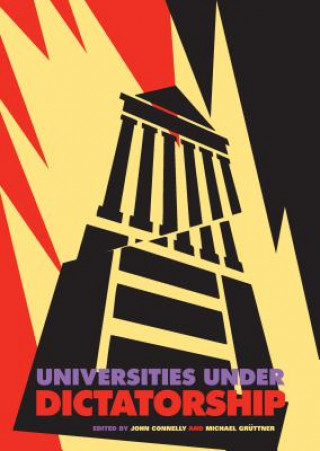
Code: 04564009
Universities Under Dictatorship
by John Connelly, Michael Gruttner
Dictatorships destroy intellectual freedom, yet universities need it. How, then, can universities function under dictatorships, and what roles do they play? Are they more a support or a danger to the system? In this volume, leadin ... more
- Language:
 English
English - Binding: Hardback
- Number of pages: 320
Publisher: Pennsylvania State University Press, 2005
- More about this

103.93 €
Availability:
50/50 We think title might be available. Upon your order we will do our best to get it within 6 weeks.
We think title might be available. Upon your order we will do our best to get it within 6 weeks.We search the world
You might also like
-

Seriously Scary Poems
7.57 € -

Organization of Business
81.10 € -

If God Is Love
17.91 € -

Charm City
13.92 € -12 % -

BMW M3
37.57 € -17 % -

Metamorphosen Des Kapitalismus - Und Seiner Kritik
52.01 €
Give this book as a present today
- Order book and choose Gift Order.
- We will send you book gift voucher at once. You can give it out to anyone.
- Book will be send to donee, nothing more to care about.
Availability alert
Enter your e-mail address and once book will be available,
we will send you a message. It's that simple.
More about Universities Under Dictatorship
You get 257 loyalty points
 Book synopsis
Book synopsis
Dictatorships destroy intellectual freedom, yet universities need it. How, then, can universities function under dictatorships, and what roles do they play? Are they more a support or a danger to the system? In this volume, leading experts from five countries explore the many dimensions of accommodation and conflict, control and independence, subservience and resistance that characterized the relationship of universities to dictatorial regimes in communist and fascist states during the twentieth century: Nazi Germany, Mussolini's Italy, Francoist Spain, Maoist China, the Soviet Union, and the Soviet bloc countries of Czechoslovakia, East Germany, Hungary, and Poland. Comparisons across these cases reveal that the higher-education policies of modern dictatorships were characterized by a basic conflict of aims. On the one hand, universities were supposed to propagate reigning ideology and serve as training grounds for a dependable elite. Consequently, university autonomy was restricted, research utilized for political legitimation, personnel policies subjected to political calculus, and many undesired scholars simply put out on the street. On the other hand, modern dictatorships needed well-educated scientists, physicians, teachers, and engineers for the implementation of their political, economic, and military agendas. Communist and fascist leaders thus confronted the basic question of whether universities should be seen primarily as producers of ideology and functionaries loyal to the party line or as places where indispensable knowledge was made available. Dictatorships that opted to subject universities to rigorous political control reduced their scholarly productivity. But if theinstitutes of higher learning were left with too much autonomy, there was a danger that they would go astray politically. Besides the editors, the contributors are Ruth Ben-Ghiat, Michael David-Fox, Jan Havranek, Ralph Jessen, Gyorgy Peteri, Miguel Angel Ruiz Carnicer, and Dou
 Book details
Book details
Book category Knihy po anglicky Society & social sciences Education Higher & further education, tertiary education
103.93 €
- Full title: Universities Under Dictatorship
- Author: John Connelly, Michael Gruttner
- Language:
 English
English - Binding: Hardback
- Number of pages: 320
- EAN: 9780271026954
- ISBN: 0271026952
- ID: 04564009
- Publisher: Pennsylvania State University Press
- Weight: 594 g
- Dimensions: 229 × 152 × 19 mm
- Date of publishing: 24. October 2005
Trending among others
-

How to Be Sort of Happy in Law School
18.83 € -19 % -

Attachment in the Classroom
38.49 € -

What They Teach You at Harvard Business School
14.43 € -23 % -

8 Practice Tests for the SAT
25.90 € -1 % -

Educating Physicians - A Call for Reform of Medical School and Residency
57.95 € -

Get into Medical School - 1250 UKCAT Practice Questions. Includes Full Mock Exam
23.85 € -

Excellent Sheep
11.15 € -23 % -

SAT Subject Test Physics
19.96 € -13 % -

Little Book of Yes
7.77 € -23 % -

Medical School Interviews: a Practical Guide to Help You Get That Place at Medical School - Over 150 Questions Analysed. Includes Mini-multi Interview
35.73 € -

Succeed in Your Medical School Interview
29.89 € -4 % -

How to Study for a Mathematics Degree
27.23 € -

Training Activities That Work Volume 1
48.02 € -

Diversity Myth
23.65 € -

Planning Your PhD
13.92 € -

How to Master the BMAT
20.78 € -14 % -

In Defense of a Liberal Education
29.48 € -10 % -

Official GRE Value Combo
33.58 € -31 % -

Teaching for Quality Learning at University
58.77 € -

50 Successful Harvard Application Essays
15.04 € -22 % -

Learning Teaching
28.97 € -7 % -

PLC Book
29.59 € -7 % -

Most Beautiful Universities in the World
37.06 € -13 % -

Educating Architects
56.72 € -

GRE Prep by Magoosh
28.36 € -

That Oxford Girl
11.15 € -23 % -

Routledge Handbook of Higher Education for Sustainable Development
83.14 € -

Handbook of Adult and Continuing Education
102.40 € -9 % -

Leader's Guide to Coaching in Schools
36.75 € -

GRE Prep Course
39.42 € -4 % -

Homeschool
41.36 € -4 % -

Education Policy Unravelled
74.54 € -

Palgrave Handbook of Textbook Studies
414.74 € -

On Teaching Religion
82.53 € -

What are Universities For?
12.28 € -23 % -

History of the Royal Academy of Music
66.55 € -

Research Universities and the Public Good
33.68 € -6 % -

Open The Gates To The Ivy League
20.16 € -

Consolidating Colleges and Merging Universities
54.57 € -

Mind and Method of the Legal Academic
106.60 € -10 % -

SAT Wars
44.03 € -

Knowledge for Sale
34.50 € -

Teacher Educators Rethink Self-Assessment in Higher Education
49.45 € -

Problem-Based Learning in Clinical Education
139.57 € -

Is For Admission
17.60 € -3 % -

Overcoming the Barriers to Higher Education
30.10 € -

Realizing the Power of Professional Learning
43.10 € -

Why They Can't Write
39.52 € -

International Perspectives on Home Education
70.86 €
Osobný odber Bratislava a 2642 dalších
Copyright ©2008-24 najlacnejsie-knihy.sk Všetky práva vyhradenéSúkromieCookies


 21 miliónov titulov
21 miliónov titulov Vrátenie do mesiaca
Vrátenie do mesiaca 02/210 210 99 (8-15.30h)
02/210 210 99 (8-15.30h)